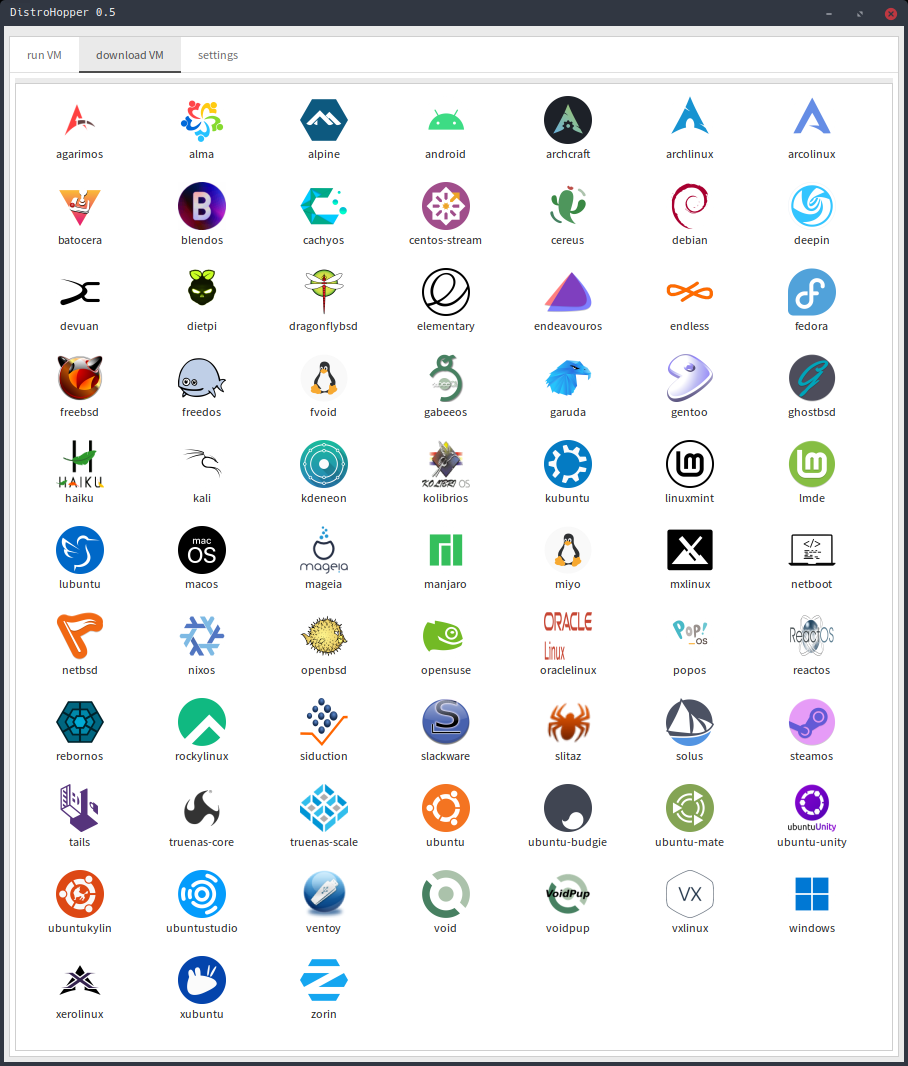| config | ||
| docs | ||
| documents | ||
| icons | ||
| .gitignore | ||
| _config.yml | ||
| addnewtoquickgui.sh | ||
| CNAME | ||
| dh | ||
| dhT | ||
| distrohopper.png | ||
| favicon.ico | ||
| hopB.png | ||
| hopB.svg | ||
| LICENSE | ||
| macrecovery | ||
| newvm.tmp | ||
| quickemu | ||
| quickget | ||
| README-web.md | ||
| README.md | ||
| windowskey | ||
Want you try new Operating system?
try
Quickly download, create and run VM of any(TODO) operating system.
Licensed under AGPL3
Still Testing version!
quickly create and run VMs
As a base excellent quickemu
you can download new distro with few clicks of a mouse
GUI using yad
See it in action on youtube...
or command line?...
TUI using fzf
.Desktop file generator
It will simple generate .desktop files for every supported and downloaded VM in quickemu. So you can link it anywhere...
Why am I doing it?
Because I wanna learn
-
Linux
-
Bash
-
yad
-
project management
And contribute to open source
play with Quickemu
And easily add new distros to it
How to run DistroHopper?
You need fullfill the requirement first...
Quickemu.
Requirements (For running VMs)
- QEMU (6.0.0 or newer) with GTK, SDL, SPICE & VirtFS support
- bash (4.0 or newer)
- Coreutils
- EDK II
- grep
- jq
- LSB
- procps
- python3
- macrecovery
- mkisofs
- usbutils
- util-linux
- sed
- socat
- spicy
- swtpm
- Wget
- xdg-user-dirs
- xrandr
- zsync
- unzip
Installing Requirements
For Ubuntu, Arch and nixos systems the ppa, AUR or nix packaging will take care of the dependencies. For other host distributions or operating systems it will be necessary to install the above requirements or their equivalents.
These examples may save a little typing
Debian:
sudo apt install qemu bash coreutils ovmf grep jq lsb procps python3 genisoimage usbutils util-linux sed spice-client-gtk swtpm wget xdg-user-dirs zsync unzip
Fedora:
sudo dnf install qemu bash coreutils edk2-tools grep jq lsb procps python3 genisoimage usbutils util-linux sed spice-gtk-tools swtpm wget xdg-user-dirs xrandr unzip
Void Linux:
sudo xbps-install qemu bash coreutils grep jq procps-ng python3 util-linux sed spice-gtk swtpm usbutils wget xdg-user-dirs xrandr unzip zsync socat
For Distrohopper to work you need wget yad fzf quickemu is included
How to install DistroHopper?
You need get copy of distrohopper
If you want more stable experience, download latest release from GitHub
or
If you want latest developer version... (could have bugs)
git clone https://github.com/oSoWoSo/DistroHopper
Enter created/unpacked distrohopper directory
Then enter config directory
cd distrohopper/config
And run
./1stRun.sh
Now should be good to go...
How to run
Just run from terminal
dh
or for TUI version (Download and run from/into same directory)
dh -t
Desktop files
All desktop files will be storred in your .config in directories /distrohopper/ready and supported
Fell free to link them anywhere you want...
Currently supported Distribution:
In screenshot above...
Github discussion:
Project chat group:
If anyone wanna join, here is one SimpleX way
(check the software! even if you don't want chat about DistroHopper) Simplex website
Without these amazing projects it wouldn't be posible:
GUI depends on yad
TUI depends on fzf
For easy of use
For commiting and working with github
Edited
For diff
for Logo and icons
and
logo by bit repaired by me..
Everything done on
Mirrored on
DistroHopper










